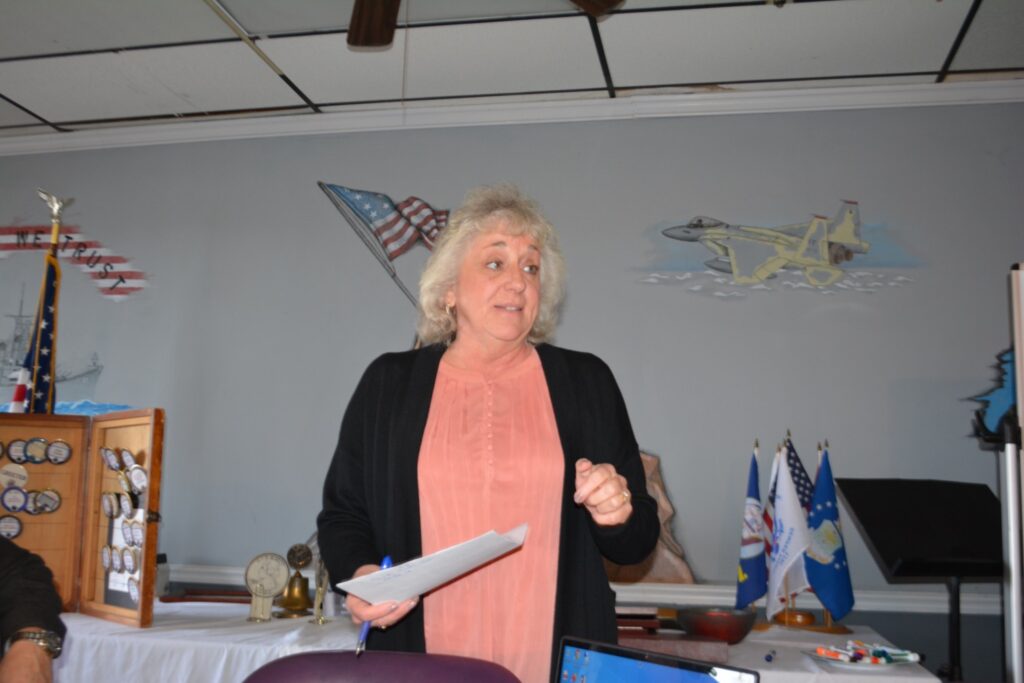The guest speaker at the Wednesday Lions meeting was Pam Timmons, Director of Development for the Hough Ear Institute.
“Hough Ear institute was started by Dr. Jack Hough (pronounced huff) many years ago. He was part of the physicians that designed the cochlear implant….Dr. Huff then hired Dr. Kopke and they started doing research,” said Ms. Timmons.

She instructed the members to look at the brochure that she passed out and pointed out a picture and said, “This is the baby hair cells.” Lion and local District Attorney Max Cook quipped that it looks like a mop.
“There are 15,000 of these in each of your cochlea inside your ear. Our scientists at Hough Ear Institute grew this, it’s something your body can’t do on its own, once they die, they are dead and they can’t be regenerated. But we’ve been able to regenerate these hair cells. We have come up with a pill; right now it is called NHPN-101. The pill formula not only grows hair cells but it also regrows the nerves. The nerves and the hair cells have to hook up together and they wave in your ear and that is how you hear.”
A member asked Ms. Timmons what kills hair cells. Ms. Timmons replied: “There is age, toxins like a lot of chemos and things like that will kill your hair cells, and noise. There is a protein, a tau protein, it’s almost like a cancer, it folds over, and it continues to spread; two becomes four, four becomes eight, and it just continues to do damage. A lot of people in the military are obviously episode to a lot of loud blasts, noise, gunshots, and things like that. They kill your hair cells because of this tau protein.” She also mentioned that people who were exposed to loud music at concerts when they are young are likely to have hearing loss.
“Another thing is tinnitus, the ringing in your ears that you hear. A lot of people, if they don’t have hearing loss, they might have tinnitus…We have come up with this pill formula that is also in a liquid form that you can inject. Right now, let’s say you have an ear infection in your cochlea, and you need to get medication in there, they inject the medication into your ear, and it will escape down your Eustachian tubes and the majority of the medicine is going to go away. We are coming up with a device right now that can take this medication based off of a positive or negative charge and force it through the middle ears so that 80% of the medicine will get there.”
Ms Timmons said that during COVID, the scientists at the Institute started looking at the brains of the rat models because “You hear from your brain. We discovered it also stopped the degeneration, just like it does with the tau protein. Alzheimer’s, Diabetes, ALS, and Parkinson’s are all a brain thing and the tau protein keeps on folding over and degenerating. Timmons went on to say that the NHPN-1010 formula stopped brain degeneration in the rat models that have Alzheimer’s. She explained that the clinical trial process is a long and arduous process, and she further explained the purpose of compassionate use for a drug that has yet been approved by the FDA. “It’s when the pharmaceutical company and the physician get together, and it’s almost a life-threatening thing, then they will go ahead and let someone go ahead and have the medication that hasn’t passed all of the trials.”
Ms. Timmons told the story of a young man who had a brain tumor removed and subsequently developed tinnitus so sober that a crowd of people talking was painful. The patient was able to obtain compassionate use for the drug to treat tinnitus.
Ms. Timmons warned of the dangers of not protecting one’s hearing by not wearing ear protection while doing such mundane tasks as mowing the lawn. She also said there was a concern for teenagers wearing earbuds and listening to loud music.
Timmons said the Institute had received several grants and donations and was $30,000 shy of raising $400,000 in matching funds for Alzheimer’s research.
Anyone interested in supporting this life-altering research should call 1-405-639-2877 or send an email to info@houghear.org, or go to their website at www.houghers.org.






